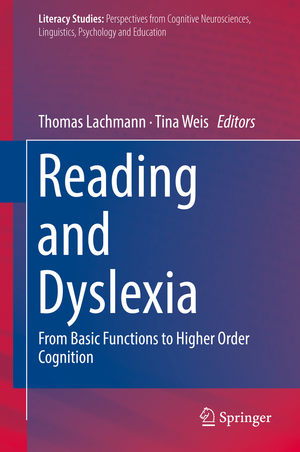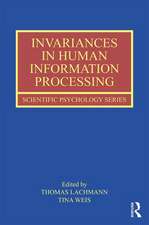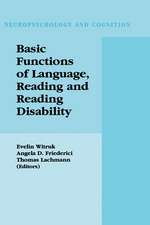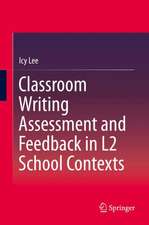Reading and Dyslexia: From Basic Functions to Higher Order Cognition: Literacy Studies, cartea 16
Editat de Thomas Lachmann, Tina Weisen Limba Engleză Hardback – 8 oct 2018
Reading is one of the most intriguing feats human evolution ever came up with. There is no evolutionary basis for reading as such; reading is secondary to language and the result of a complex skill acquisition at the end of which almost all pre-existing cognitive functions are mobilized. With the right instruction and practice most people learn this skill smoothly. Some, however, have problems, despite same opportunities and general cognitive abilities. This developmental dyslexia results from a neuro developmental disorder leading to deficits in reading relevant information processing. But what deficits are these, and can they be trained?
| Toate formatele și edițiile | Preț | Express |
|---|---|---|
| Paperback (1) | 586.69 lei 38-44 zile | |
| Springer International Publishing – 19 ian 2019 | 586.69 lei 38-44 zile | |
| Hardback (1) | 802.74 lei 38-44 zile | |
| Springer International Publishing – 8 oct 2018 | 802.74 lei 38-44 zile |
Din seria Literacy Studies
- 18%
 Preț: 955.25 lei
Preț: 955.25 lei - 18%
 Preț: 968.65 lei
Preț: 968.65 lei - 15%
 Preț: 645.47 lei
Preț: 645.47 lei - 5%
 Preț: 1100.85 lei
Preț: 1100.85 lei - 18%
 Preț: 886.40 lei
Preț: 886.40 lei - 15%
 Preț: 651.02 lei
Preț: 651.02 lei - 15%
 Preț: 640.88 lei
Preț: 640.88 lei - 18%
 Preț: 786.84 lei
Preț: 786.84 lei - 18%
 Preț: 954.45 lei
Preț: 954.45 lei - 15%
 Preț: 701.72 lei
Preț: 701.72 lei - 15%
 Preț: 651.84 lei
Preț: 651.84 lei - 18%
 Preț: 890.68 lei
Preț: 890.68 lei - 18%
 Preț: 946.41 lei
Preț: 946.41 lei - 15%
 Preț: 638.57 lei
Preț: 638.57 lei - 18%
 Preț: 944.36 lei
Preț: 944.36 lei -
 Preț: 427.49 lei
Preț: 427.49 lei - 20%
 Preț: 620.45 lei
Preț: 620.45 lei - 18%
 Preț: 905.06 lei
Preț: 905.06 lei - 15%
 Preț: 635.65 lei
Preț: 635.65 lei - 15%
 Preț: 639.41 lei
Preț: 639.41 lei - 20%
 Preț: 564.51 lei
Preț: 564.51 lei - 15%
 Preț: 637.93 lei
Preț: 637.93 lei - 15%
 Preț: 654.12 lei
Preț: 654.12 lei
Preț: 802.74 lei
Preț vechi: 1056.23 lei
-24% Nou
Puncte Express: 1204
Preț estimativ în valută:
153.60€ • 160.80$ • 127.10£
153.60€ • 160.80$ • 127.10£
Carte tipărită la comandă
Livrare economică 01-07 aprilie
Preluare comenzi: 021 569.72.76
Specificații
ISBN-13: 9783319908045
ISBN-10: 3319908049
Pagini: 375
Ilustrații: IX, 339 p. 43 illus., 7 illus. in color.
Dimensiuni: 155 x 235 x 12 mm
Greutate: 0.73 kg
Ediția:1st ed. 2018
Editura: Springer International Publishing
Colecția Springer
Seria Literacy Studies
Locul publicării:Cham, Switzerland
ISBN-10: 3319908049
Pagini: 375
Ilustrații: IX, 339 p. 43 illus., 7 illus. in color.
Dimensiuni: 155 x 235 x 12 mm
Greutate: 0.73 kg
Ediția:1st ed. 2018
Editura: Springer International Publishing
Colecția Springer
Seria Literacy Studies
Locul publicării:Cham, Switzerland
Cuprins
Introduction, Thomas Lachmann.- Part I: Literacy Acquisition and Skilled Reading in Different Orthographies.- The Methods Issue Revisited: From a Developmental and a Socio-Cultural-Political Perspective, José Morais.- Domain Generality and Specificity of Statistical Learning and its Relation with Reading Ability, Yi-Hui Hung, Stephen J. Frost, and Kenneth R. Pugh.- Searching for the Orthographic Lexicon in the Visual Word Form Area, Heinz Wimmer and Philipp Ludersdorfer.- Simple View of Reading (SVR) in Different Orthographies: Seeing the Forest with the Trees, R. Malatesha Joshi.- Part II: Developmental Dyslexia: From Basic Functions to Higher Order Cognition.- The Role of Rodent Models in Dyslexia Research: Understanding the Brain, Sex Differences, Lateralization, and Behavior, Albert M. Galaburda.- The Magnocellular Theory of Developmental Dyslexia, John Stein.- Auditory Processing in Developmental Dyslexia: Some Considerations and Challenges, Caroline Witton and Joel B. Talcott.- From Auditory Rhythm Processing to Grapheme-to-Phoneme Conversion: How Neural Oscillations Can Shed Light on Developmental Dyslexia, Marie Lallier, Mikel Lizarazu, Nicola Molinaro, Mathieu Bourguignon, Paula R´ıos-Lopes, and Manuel Carreiras.- Dyslexia – A Failure in Attaining Expert-Level Reading Due to Poor Formation of Auditory Predictions, Sagi Jaffe-Dax, Luba Daikhin and Merav Ahissar.- The “Rowdy Classroom Problem” in Children with Dyslexia: A Review, Axelle Calcus, Ingrid Hoonhorst, C´ecile Colin, Paul Deltenre and R´egine Kolinsky.- From Subtypes to Taxons: Identifying Distinctive Profiles of Reading Development in Children, Adrian Burgess, Caroline Witton, Laura Shapiro, and Joel B. Talcott.- Procedural Learning, Dyslexia and Delayed Neural Commitment, Roderick I. Nicolson and Angela J. Fawcett.- Reading and Dyslexia: The Functional Coordination Framework, Thomas Lachmann.- Part III: Training and Remediation.- The Birth of Neuroplasticity Interventions: A Twenty Year Perspective, Paula Tallal and William Jenkins.- Effects of the Computer-Based Training Program Lautarium on Phonological Awareness and Reading and Spelling Abilities in German Second-Graders, Maria Klatte, Kirstin Bergst¨om, Claudia Steinbrink, Marita Konerding,and Thomas Lachmann.
Textul de pe ultima copertă
In this volume a group of well-known experts of the field cover topics ranging from basic visual and auditory information processing to higher order cognition in reading and dyslexia, from basic research to remediation approaches and from well-established theories to new hypotheses about reading acquisition and causes for its failure.
Reading is one of the most intriguing feats human evolution ever came up with. There is no evolutionary basis for reading as such; reading is secondary to language and the result of a complex skill acquisition at the end of which almost all pre-existing cognitive functions are mobilized. With the right instruction and practice most people learn this skill smoothly. Some, however, have problems, despite same opportunities and general cognitive abilities. This developmental dyslexia results from a neuro developmental disorder leading to deficits in reading relevant information processing. But what deficits are these, and can they be trained?
Reading is one of the most intriguing feats human evolution ever came up with. There is no evolutionary basis for reading as such; reading is secondary to language and the result of a complex skill acquisition at the end of which almost all pre-existing cognitive functions are mobilized. With the right instruction and practice most people learn this skill smoothly. Some, however, have problems, despite same opportunities and general cognitive abilities. This developmental dyslexia results from a neuro developmental disorder leading to deficits in reading relevant information processing. But what deficits are these, and can they be trained?
Caracteristici
Includes contributions from pioneers and leading researchers in the field Covers theories on reading and dyslexia as well as remediation approaches Follows approaches from basic perception to higher order functions























